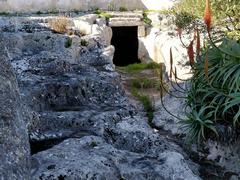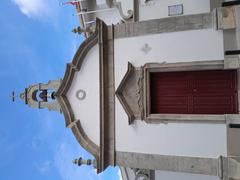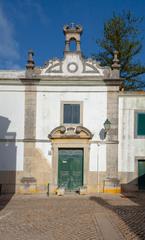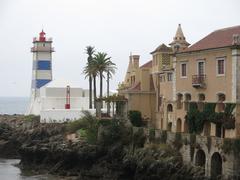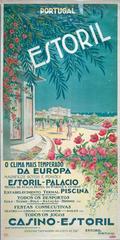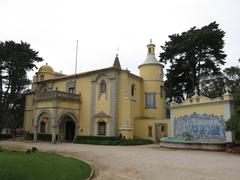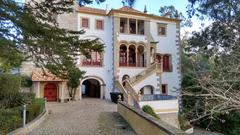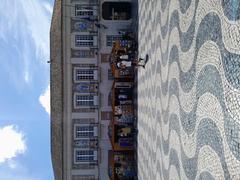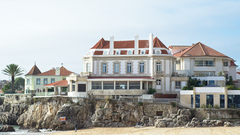Vila Maria Pia Estoril, Portugal: Visiting Hours, Tickets, and Travel Guide
Date: 14/06/2025
Introduction: History and Cultural Significance
Perched along the scenic Atlantic coast in Monte Estoril, Vila Maria Pia is a distinguished hallmark of the Portuguese Riviera’s aristocratic heritage. Constructed in the late 19th century as a summer retreat in homage to Queen Maria Pia of Savoy, wife of King Luís I, the villa is an architectural treasure that blends romantic Portuguese chalet style with ornate craftsmanship—evident in its woodwork, azulejo tiles, and terraced gardens overlooking the ocean (Stone Capital; ARX Portugal).
Vila Maria Pia also played a pivotal role in the “Costa dos Reis” era, when Estoril became a haven for exiled European royalty, further cementing its cultural and historical significance. Today, the estate stands as a tastefully restored private residential complex, harmoniously integrating its royal legacy with modern-day luxury living. While interior access is restricted, the villa’s gardens, panoramic views, and proximity to other historic sites offer visitors a rich and rewarding experience (Forbes; Espaço de Arquitetura).
Table of Contents
- Origins and Architectural Heritage
- Visiting Vila Maria Pia: Practical Information
- Royal Connections and Historic Events
- Cultural Significance and Legacy
- Visiting Experience and Nearby Attractions
- Frequently Asked Questions (FAQ)
- Traveler Tips
- References
Origins and Architectural Heritage
Construction and Early Ownership
The villa emerged during the Belle Époque, when Estoril transformed into a fashionable resort for the Portuguese aristocracy and European royals. Although Queen Maria Pia never resided here, the villa’s name reflects her influential role in the modern Portuguese monarchy and her patronage of the arts (Stone Capital).
Key Architectural Features
- Ornate wooden verandas and decorative eaves
- Azulejo tilework accenting facades and interiors
- Panoramic windows framing ocean views
- Terraced gardens designed for privacy and grandeur
- Restored stone columns and diamond-shaped roof tiles, replicated from 19th-century photographs (Diário Imobiliário)
The estate’s restoration, led by ARX Portugal, preserved these historical elements while incorporating contemporary residential amenities (ARX Portugal; Espaço de Arquitetura).
Visiting Vila Maria Pia: Practical Information
Location
- Address: Rua Dom Antonio Guedes Herédia, Monte Estoril, Portugal (Stone Capital)
- Setting: Cliffside with panoramic views over the Bay of Cascais and Atlantic Ocean
Access and Transportation
- By Car: Via A5 motorway from Lisbon; underground parking available for residents and guests
- By Train: Cascais Line from Lisbon’s Cais do Sodré to Monte Estoril station (short walk to the villa) (Forbes)
- On Foot: Close to beaches, promenade, and Estoril/Cascais town centers
Visiting Hours and Tickets
Important: Vila Maria Pia is a private residential development.
- Public visiting hours: Not available (no ticket sales)
- Gardens and architecture can be admired from public viewpoints and coastal paths
- Private viewings: By appointment only, typically for prospective buyers (Idealista)
Amenities and Facilities
- Landscaped gardens, indoor and outdoor pools, spa facilities, and underground parking for residents (Forbes)
- Select apartments with private terraces and pools
- Access to nearby beaches, promenades, and parks
Royal Connections and Historic Events
Sanctuary for European Royalty
Estoril became known as the “Coast of Kings” in the 20th century, hosting exiled monarchs such as King Umberto II of Italy and Queen Marie José of Belgium. Vila Maria Pia’s association with royalty is further highlighted by its namesake and its pivotal role in royal gatherings (Stone Capital).
1954 Royal Wedding Festivities
The 1954 wedding of Prince Alexander of Yugoslavia and Princess Maria Pia of Savoy brought together more than 100 royals and dignitaries. While the main celebrations took place at nearby venues, the villa’s connection to the Savoy family and the event’s radiant guest list added to its mystique (The Royal Watcher).
Cultural Significance and Legacy
Vila Maria Pia stands as a symbol of Estoril’s cosmopolitan heritage, reflecting the area’s transformation into a sanctuary for artists, intellectuals, and European aristocracy. Its meticulous restoration ensures that the villa’s historic character endures, even as it adapts to contemporary residential use (ARX Portugal; Stone Capital).
Visiting Experience and Nearby Attractions
Viewing the Property
- Best vantage points: Coastal promenade, Jardim dos Passarinhos park, and scenic cliffside paths
- Photography: Sunset and early morning light offer dramatic views of the villa’s façade and gardens
Nearby Sights
- Palace Hotel Estoril: Historic hotel renowned for hosting royalty and celebrities
- Castro Guimarães Museum: Art and heritage museum in Cascais
- Estoril Casino: One of Europe’s most iconic casinos
- Beaches: Praia do Tamariz and Praia das Moitas are within walking distance (SintraCascaisSesimbra.com)
Dining and Shopping
Monte Estoril and Cascais offer abundant cafes, seafood restaurants, and boutiques, many with sea-facing terraces.
Traveler Tips
- Respect Privacy: Vila Maria Pia is a private residence; do not enter the grounds without permission.
- Best Views: The coastal promenade offers excellent photo opportunities.
- Accessibility: Some paths around the villa are steep—wear comfortable shoes.
- Getting Around: Public transport is efficient; parking is limited in peak season.
- Local Etiquette: Greet locals with “Bom dia” and dress smart-casual when dining out.
Frequently Asked Questions (FAQ)
Q: Can I tour Vila Maria Pia’s interior?
A: No, interior access is reserved for residents and prospective buyers.
Q: Are there public visiting hours or ticket sales?
A: No public visiting hours or tickets are available.
Q: How do I arrange a private viewing?
A: Contact Stone Capital, Athena Advisers, or Modern for details.
Q: What are the best nearby attractions?
A: Beaches, the historic centers of Estoril and Cascais, Jardim dos Passarinhos park, and golf courses.
Q: Is the area safe for tourists?
A: Yes, Estoril and Cascais are among Portugal’s safest and most welcoming regions (Forbes).
Summary and Final Thoughts
Vila Maria Pia embodies the grandeur of Portugal’s royal heritage set amid the breathtaking scenery of Monte Estoril. While interior access is private, its storied past, architectural beauty, and the richness of the surrounding Riviera landscape make it a rewarding stop for history lovers and travelers alike. Use the coastal promenade and public viewpoints to appreciate its elegance, and explore the vibrant cultural offerings of Estoril and Cascais for a complete experience (ARX Portugal; Stone Capital).
References and Further Reading
- Stone Capital: Vila Maria Pia – The Crown Jewel
- ARX Portugal: Maria Pia Project
- Stone Capital: Vila Maria Pia Project
- JLL Residential Portugal: Vila Maria Pia Brochure
- Forbes: New Villa Follows a Queen’s Footsteps in Cascais
- ARX Portugal: Vila Maria Pia Highlighted in Público P3
- SintraCascaisSesimbra.com: Things to Do in Estoril
- Espaço de Arquitetura: Villa Maria Pia
- Diário Imobiliário: Villa Maria Pia – Privacidade e Prestígio no Monte do Estoril
